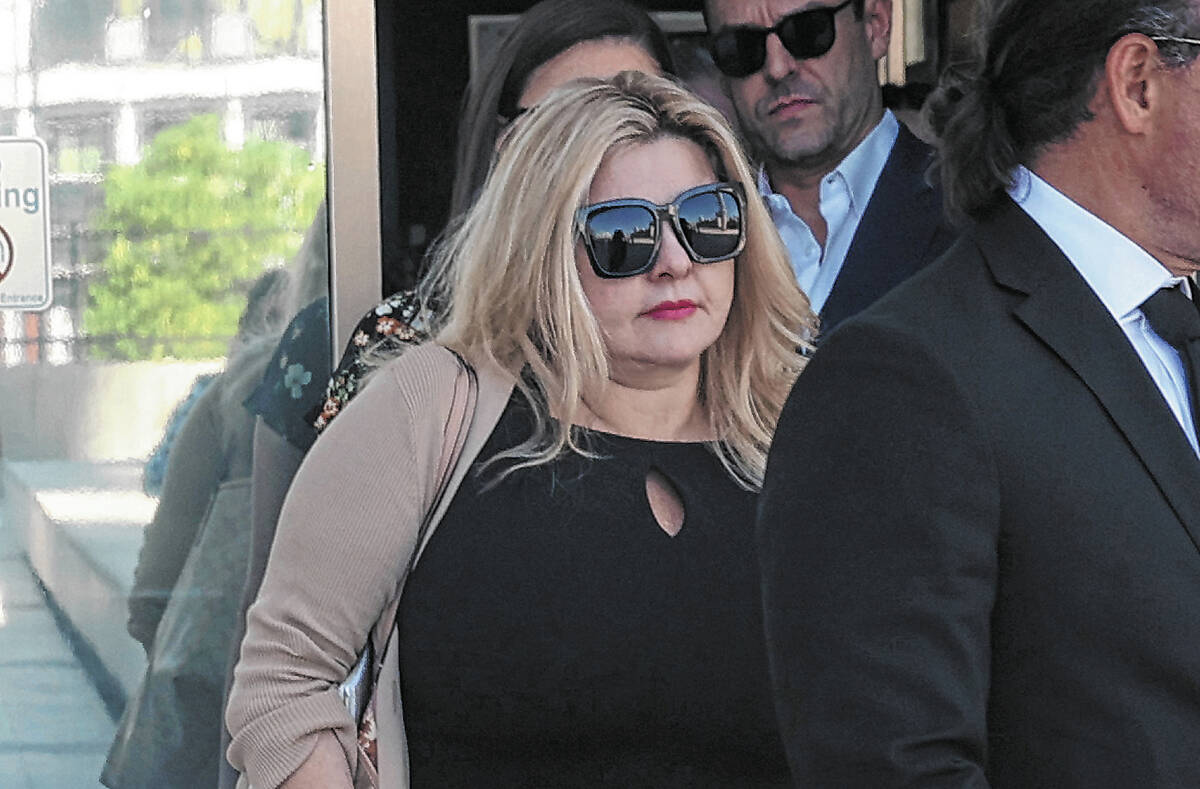Judge dismisses Michele Fiore’s request for new trial

A judge has dismissed Michele Fiore’s request for a new trial.
Fiore was found guilty in October of federal wire fraud and conspiracy charges.
Prosecutors said she raised tens of thousands of dollars for a statue of fallen Metropolitan Police Department officer Alyn Beck, but spent the funds on personal expenses such as rent, plastic surgery and her daughter’s wedding.
Her attorneys filed a post-trial motion asking for a new trial, arguing that the testimony of the former judge and councilwoman’s daughter should not have been excluded and that her prior attorney was “ineffective.”
On Friday, U.S. District Court Judge Jennifer Dorsey dismissed the motion.
“The law gives great deference to jury verdicts, so the standard for setting one aside for insufficient evidence is high: the court must find that the evidence, when viewed in the light most favorable to the prosecution, could not have supported the verdict for any rational juror,” the motion said.
“We are extremely disappointed by the order,” Fiore’s attorney Paola Armeni said Sunday. “We truly believe Ms. Fiore did not receive a fair trial is guaranteed to her as well as all of us by the United States Constitution. At this time, we will prepare for sentencing and thereafter Ms. Fiore will exercise her full appellate rights.”
Fiore declined to comment Sunday.
“Fiore has not shown that these circumstances were erroneous — let alone of the caliber that merits a new trial,” Friday’s dismissal order said.
Fiore’s daughter’s testimony
During the trial, Fiore’s daughter, Sheena Siegel, said she might have signed a check from an account for her mother’s political action committee, an account for which she was not a signatory. She admitted that signing the check would not be legal.
Federal prosecutor Alexander Gottfried asked if she was “admitting to a federal crime” and the trial paused.
After that testimony, Siegel invoked her Fifth Amendment right against self-incrimination and stopped answering questions. Prosecutors said Siegel had been offered immunity from prosecution in exchange for her cooperation and honesty, but committed perjury because her testimony about the checks may have contradicted previous grand jury testimony.
Dorsey ultimately threw out Siegel’s testimony over the objections of Michael Sanft, the attorney who represented Fiore at trial.
That controversy figures prominently in the Jan. 31 motion for a new trial filed by defense attorneys Armeni and Gia Marina.
Fiore’s lawyers said that the parties requested a sidebar and that Fiore’s previous attorney moved for a mistrial in the wake of Siegel’s testimony, a request that was denied.
The motion argued that Siegel’s “immunity agreement was erroneously withdrawn, forcing her to invoke her Fifth Amendment privilege” and causing the court to improperly strike her testimony.
Siegel could have supported her mother’s defense by testifying that money raised was used for charitable events, Armeni and Marina said.
‘Ineffective’ counsel?
Sanft was “ineffective,” Fiore’s current attorneys said in the motion.
Some “witnesses testified at trial without requisite personal knowledge, yet the defense failed to object to the line of questioning or responses elicited,” the filing said. “This failure significantly prejudiced Ms. Fiore. Indeed, several purported donors testified that they had either no direct knowledge of Ms. Fiore and/or that their donations were solicited from someone other than Fiore.”
Armeni and Marina also argued Sanft and prosecutors didn’t attempt to correct testimony from Gov. Joe Lombardo that contradicted previous statements he made.
Part of the section about Lombardo is redacted in court records. His press office did not respond to a request for comment.
Sanft said he and Lombardo “were argumentative with each other,” but he couldn’t recall any issues with Lombardo’s testimony.
‘Animus for Ms. Fiore’
Armeni and Marina asserted that Fiore’s prosecution was vindictive.
The case “was brought solely out of animus for Ms. Fiore, which stemmed from her outspoken position on the Cliven Bundy case (including being named as a defense witness), which was prosecuted by AUSA Steven Myhre and resulted in a mistrial due to prosecutorial misconduct, her political affiliation, and her involvement in the ‘badlands’ litigation which ‘was not even in her ward,’” her attorneys argued.
Fiore supported the Bundy family in their 2014 conflict with the federal government.
Dorsey ruled before the trial that Fiore could not claim the government “vindictively or selectively” prosecuted her.
Attorneys argued in the new motion that excluding testimony and evidence about the government’s motives “denied Ms. Fiore the right to a fair trial.”
Contact Katie Futterman at kfutterman@reviewjournal.com. Follow @ktfutts on X and @katiefutterman.bsky.social. Review-Journal staff writer Noble Brigham contributed to this report.